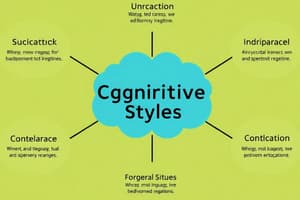Podcast
Questions and Answers
How did the Ancient Greeks primarily perceive matter?
How did the Ancient Greeks primarily perceive matter?
- As an illusion shaped by social relations
- As composed of infinite elements
- As composed of continuous interpenetrating substances
- As composed of discrete atoms (correct)
What cognitive style is associated with Ancient Chinese thinkers?
What cognitive style is associated with Ancient Chinese thinkers?
- Holistic thinking emphasizing interdependent relationships (correct)
- Reductionist thinking prioritizing object properties
- Analytical thinking centered around formal logic
- Holistic thinking focused on individual autonomy
What aspect of social life influenced the cognitive processes of the Ancient Chinese?
What aspect of social life influenced the cognitive processes of the Ancient Chinese?
- A focus on individual achievement and independence
- An emphasis on personal goals above social considerations
- A preference for formal logic and categorization
- A tendency towards social interdependence and harmony (correct)
Which statement reflects a significant difference between Eastern and Western self-conceptions?
Which statement reflects a significant difference between Eastern and Western self-conceptions?
What is a common trait of Ancient Greek cognition?
What is a common trait of Ancient Greek cognition?
How do Chinese participants generally respond when presented with contradictory propositions compared to Americans?
How do Chinese participants generally respond when presented with contradictory propositions compared to Americans?
In categorization tasks, how do East Asians differ from Americans?
In categorization tasks, how do East Asians differ from Americans?
What finding was observed in studies comparing categorization strategies between Chinese and American children?
What finding was observed in studies comparing categorization strategies between Chinese and American children?
In the context of object similarity, what did East Asians show a preference for compared to European Americans?
In the context of object similarity, what did East Asians show a preference for compared to European Americans?
What cognitive ability do East Asians exhibit according to studies on detecting covariation?
What cognitive ability do East Asians exhibit according to studies on detecting covariation?
What aspect do Americans and Canadians emphasize more in their self-descriptions compared to Japanese individuals?
What aspect do Americans and Canadians emphasize more in their self-descriptions compared to Japanese individuals?
How do cognitive attributions differ between Americans and East Asians?
How do cognitive attributions differ between Americans and East Asians?
What is the typicality effect as described in the content?
What is the typicality effect as described in the content?
Which cultural group is more comfortable with apparent contradictions in their reasoning?
Which cultural group is more comfortable with apparent contradictions in their reasoning?
In terms of conflict resolution, what approach is more typically used by Chinese participants compared to Americans?
In terms of conflict resolution, what approach is more typically used by Chinese participants compared to Americans?
Which group exhibited higher confidence in their judgments regarding covariation?
Which group exhibited higher confidence in their judgments regarding covariation?
What is the definition of field dependence?
What is the definition of field dependence?
In the animated video study, which group reported fewer observations about the field?
In the animated video study, which group reported fewer observations about the field?
Which statement about change blindness is correct?
Which statement about change blindness is correct?
How did Japanese participants perform in the background manipulation test compared to American participants?
How did Japanese participants perform in the background manipulation test compared to American participants?
Flashcards
Analytical Thinking
Analytical Thinking
A way of thinking that focuses on the individual parts or characteristics of an object or situation, paying less attention to its relationships with other things.
Holistic Thinking
Holistic Thinking
A way of thinking that emphasizes seeing things in a holistic way, focusing on how things are interconnected and relate to each other.
Independent Self
Independent Self
The idea that the self is a distinct entity, separate from others and context, with stable characteristics that don't change significantly.
Interdependent Self
Interdependent Self
Signup and view all the flashcards
Cultural Differences in Reasoning
Cultural Differences in Reasoning
Signup and view all the flashcards
Cultural Differences in Causal Attribution
Cultural Differences in Causal Attribution
Signup and view all the flashcards
Typicality Effect
Typicality Effect
Signup and view all the flashcards
Contextual Influences on Explanations
Contextual Influences on Explanations
Signup and view all the flashcards
Dialectical Thinking vs. Logic
Dialectical Thinking vs. Logic
Signup and view all the flashcards
Independent vs. Interdependent Cultures
Independent vs. Interdependent Cultures
Signup and view all the flashcards
Cultural Differences in Truth-Seeking
Cultural Differences in Truth-Seeking
Signup and view all the flashcards
East Asian Categorization
East Asian Categorization
Signup and view all the flashcards
American Categorization
American Categorization
Signup and view all the flashcards
East Asian Covariation Detection
East Asian Covariation Detection
Signup and view all the flashcards
Covariation Detection Study
Covariation Detection Study
Signup and view all the flashcards
Field Dependence
Field Dependence
Signup and view all the flashcards
Rod and Frame Test
Rod and Frame Test
Signup and view all the flashcards
Attention to the Field
Attention to the Field
Signup and view all the flashcards
Change Blindness
Change Blindness
Signup and view all the flashcards
Cultural Differences in Perception
Cultural Differences in Perception
Signup and view all the flashcards
Study Notes
Culture & Point of View - Nisbett & Masuda
- Ancient Greeks emphasized analytical thinking, formalized logic, and focused on the inherent properties of objects. They saw the world as stable and composed of discrete atoms.
- Ancient Chinese emphasized holistic thinking, considering actions within a field of forces, and focusing on relationships between objects. They saw the world as constantly changing and composed of interpenetrating substances.
- Cultural differences in social structures may have influenced these contrasting cognitive styles. Chinese societies emphasized social interdependence and harmony, while Greek societies emphasized individualism and autonomy.
- Modern East Asians and Westerners show similar cognitive differences in their attributional styles. Westerners tend to explain events based on object properties, while East Asians are more likely to attribute them to interactions between objects and their context.
- These differences also apply to causal attributions and predictions for inanimate objects and animals, with East Asians being more likely to consider contextual factors.
- East Asians were more comfortable with apparent contradictions than Americans, preferring a middle way solution.
- East Asians classify objects and events based on relationships and family resemblance, while Americans categorize based on rules and membership.
- East Asians excel at detecting relationships between events and covariation.
- East Asians are more field-dependent, tending to be more influenced by the surrounding context (e.g., the rod and frame test).
- East Asians show more attention to the field, mentioning relationships and interactions between objects more than Americans.
- Field dependence likely impacts responses to changes within scenes; Japanese are more likely to detect relational changes than Americans.
- Environmental affordances (e.g., the number and arrangement of objects) influence attention and perception with East Asian environments promoting a focus on broader aspects of the field.
- East Asians tend to perceive time more as a continuous process of change than Americans do.
- East Asians reported more differences between the past and future than Americans, predicting reversals of trends more often.
- Both East Asian and American perceptions of personal events and narratives show differences, with East Asians focusing more on relational dynamics and emotional states.
Studying That Suits You
Use AI to generate personalized quizzes and flashcards to suit your learning preferences.




